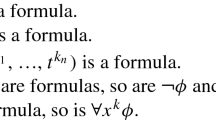Abstract
Aim of the paper is to revise Boolos’ reinterpretation of second-order monadic logic in terms of plural quantification ([4], [5]) and expand it to full second order logic. Introducing the idealization of plural acts of choice, performed by a suitable team of agents, we will develop a notion of plural reference. Plural quantification will be then explained in terms of plural reference. As an application, we will sketch a structuralist reconstruction of second-order arithmetic based on the axiom of infinite à la Dedekind, as the unique non-logical axiom. We will also sketch a virtual interpretation of the classical continuum involving no other infinite than a countable plurality of individuals.
Similar content being viewed by others
References
Balaguer M.: Platonism and anti-platonism in mathematics. Oxford University Press, Oxford (1998)
Balaguer M.: ‘Fictionalism, theft, and the story of mathematics’. Philosophia Mathematica 17, 1–32 (2008)
Black M.: ‘The elusiveness of sets’. The Review of Metaphysics 24, 615–636 (1971)
Boolos G.: ‘To be is to be the value of a variable (or to be some values of some variables)’. Journal of Philosophy 81, 430–49 (1984)
Boolos G.: ‘Nominalist platonism’. Philosophical Review 94, 327–44 (1985)
Brown J.R.: ‘Kitcher’s mathematical naturalism’. Croatian Journal of Philosophy 3, 1–20 (2003)
Dedekind R.: Essays on the theory of numbers: I. Continuity and irrational numbers, II. The nature and meaning of numbers. Dover Publications, New York (1963)
Dummett M.: ‘Neo-Fregeans: In bad Company’. In: Schirn, M. (ed.) The Philosophy of Mathematics Today, pp. 369–388. Oxford University Press, Oxford (1998)
Hoffman S.: ‘Kitcher, ideal agents, and fictionalism’. Philosophia Mathematica 12(1), 3–17 (2004)
Kitcher P.: The nature of mathematical knowledge. Oxford University Press, Oxford (1984)
Kripke S.A.: Naming and necessity. Blackwell, Oxford (1980)
Lewis D.: ‘Mathematics is megethology’. Philosophia Mathematica 1, 3–23 (1993)
Linsky B., Zalta E.N.: ‘What is neologicism?’. Bulletin of Symbolic Logic 12, 60–99 (2006)
Martino E.: ‘Arbitrary reference in mathematical reasoning’. Topoi 20, 65–77 (2001)
Parsons C.: ‘The structuralist view of mathematical objects’. Synthese 84, 303–346 (1990)
Resnik M.D.: ‘Second-order logic still wild’. The Journal of Philosophy 85, 75–87 (1988)
Russell B.: The Principles of mathematics. Cambridge University Press, Cambridge (1903)
Russell B.: ‘Mathematical logic as based on the theory of types’. In: Van Heijenoort, J. (ed.) From Frege to Goedel, pp. 150–182. MIT Press, Cambridge (MA) (1908)
Stenius E.: ‘Sets’. Synthese 27, 161–188 (1974)
Thomas R.: ‘Mathematics and fiction I: Identification’. Logique et Analyse 43, 301–340 (2000)
Thomas R.: ‘Mathematics and fiction II: Analogy’. Logique et Analyse 45, 185–228 (2002)
Wright C.: Frege’s conception of numbers as objects. Aberdeen University Press, Aberdeen (1983)
Wright C.: Truth and objectivity. Harvard University Press, Cambridge (MA) (1992)
Yablo S.: ‘Go figure: A path through fictionalism’. Midwest Studies in Philosophy 25, 72–102 (2002)
Author information
Authors and Affiliations
Corresponding author
Rights and permissions
About this article
Cite this article
Carrara, M., Martino, E. To Be is to Be the Object of a Possible Act of Choice. Stud Logica 96, 289–313 (2010). https://doi.org/10.1007/s11225-010-9282-2
Published:
Issue Date:
DOI: https://doi.org/10.1007/s11225-010-9282-2



